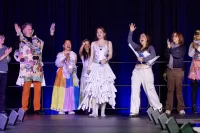
Environmentalist to discuss 'Mao's War Against Nature'
Environmentalist Judith Shapiro will discuss Mao’s War Against Nature: The Lessons for Today at 4 p.m. Monday, April 30, in the Keck Classroom (G52) of Pettengill Hall, 4 Andrews Road. The public is invited to attend free of charge. Co-director of the masters degree program in environmental policy at the School of International Service, American University, Shapiro is the author of Mao’s War Against Nature: Politics and the Environment in Revolutionary China. The book describes how the Chinese ideal of “harmony between heaven and humans” was abrogated in favor of Mao’s insistence that “man must conquer nature.”
Mao and the Chinese Communist Party’s “war” to bend the physical world to human will often had disastrous consequences both for human beings and the natural environment. Shapiro’s account, told in part through the voices of average Chinese citizens and officials who lived through and participated in some of the destructive campaigns, shows how the abuse of people and nature were often linked. Today, as human beings struggle to find a more harmonious relationship with the natural world, the book offers a cautionary tale with wide-ranging implications.
Shapiro is also co-author, with Liang Heng, of other well-known books on China, including Son of the Revolution, a memoir of the Cultural Revolution; After the Nightmare, an eyewitness account of China after Mao; and Cold Winds, Warm Winds , a discussion of freedom of expression in the reform period. Son of the Revolution has been translated into more than 20 languages and has sold more than 100,000 copies in English. Shapiro’s co-edited volumes include Debates on the Future of Communism and A Handbook of Current Americanisms.
Shapiro has also taught courses on contemporary China at the University of Pennsylvania, Villanova University, the New School for Social Research and the University of Aveiro in Portugal. She recently lectured in China on the role of environmental non-governmental organizations for the U.S. Department of State.
One of the first Americans to work in China after the normalization of U.S.-China relations in 1979, Shapiro taught journalism and literature to more than 600 students and faculty in Changsha, Hunan, from 1979 to 1981. Her marriage to a Chinese literature student helped launch a career as a writer and commentator on Chinese issues. Other professional experience has included co-founding and writing grants for The Chinese Intellectual, a Chinese language scholarly quarterly circulated in China and the West intended to encourage China’s development toward a more open society. Shapiro also worked from 1992 to 1994 as senior program officer for Asia at the National Endowment for Democracy and from 1988 to 1991 as a resident scholar on China at the Foreign Policy Institute in Philadelphia. Fluent in Chinese, she has served as a contract interpreter in federal courts in New York and Washington, D.C.
In mid career, Shapiro returned to school to train herself in global environmental politics. She completed a doctorate in international relations at American University, a masters in Asian studies from the University of California at Berkeley and a masters in comparative literature from the University of Illinois at Urbana. She received her bachelor’s degree in anthropology and East Asian studies from Princeton University.




